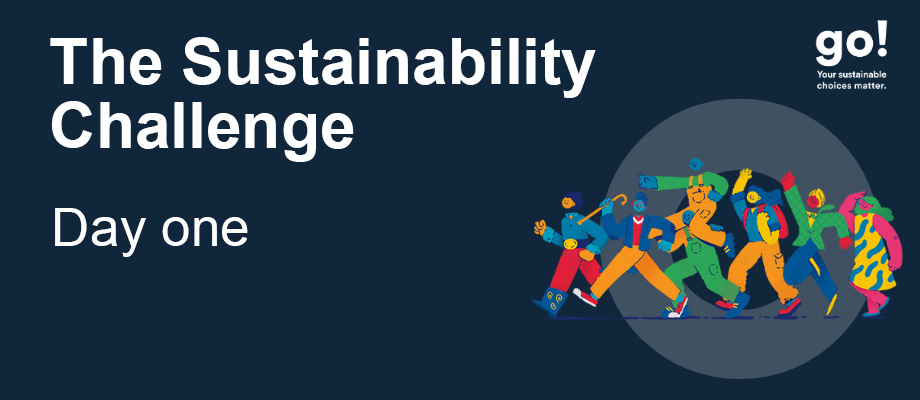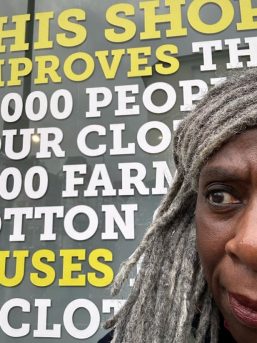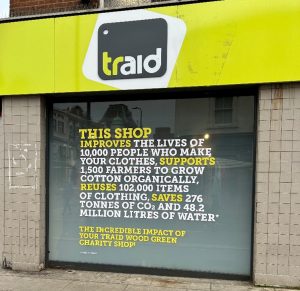
The Sustainability Challenge 2024 – Day one
March 18th, 2024
The Sustainability Challenge – part of Sustainability Action Week – sees us invite some of our senior leaders to spend the week living as sustainably as possible. It gives them the opportunity to reflect on their experience and share their thoughts with our community. This year our chancellor, Baroness Lola Young, has taken on the challenge. Read on to find out how she got on.
Day one – clothes donation and TRAID
As preparation for Sustainability Action Week, I decided to do something I’ve been putting off for a long time…
 One of my passions is fashion, and as we probably all know now, the clothing sector is one of the biggest polluting industries on the planet; it is also one of the worst for exploiting its mainly female manufacturing workforce. I must confess that although I had a vague idea of the downside of fashion, I had little sense of the extent and the severity of the problems caused by the garment industry. In 2010 I founded the All Party Parliamentary Group on Ethics and Sustainability in Fashion (APPG ESF): it was, as they say, a steep learning curve. At the time I’d not really encountered ‘fast fashion’ as a pejorative term and I soon discovered that for many people—including some parliamentarians—the idea that there was a serious debate to be had around the destructive and exploitative practices of the fashion industry was somewhere between fanciful and absurd.
One of my passions is fashion, and as we probably all know now, the clothing sector is one of the biggest polluting industries on the planet; it is also one of the worst for exploiting its mainly female manufacturing workforce. I must confess that although I had a vague idea of the downside of fashion, I had little sense of the extent and the severity of the problems caused by the garment industry. In 2010 I founded the All Party Parliamentary Group on Ethics and Sustainability in Fashion (APPG ESF): it was, as they say, a steep learning curve. At the time I’d not really encountered ‘fast fashion’ as a pejorative term and I soon discovered that for many people—including some parliamentarians—the idea that there was a serious debate to be had around the destructive and exploitative practices of the fashion industry was somewhere between fanciful and absurd.
I try to buy good quality clothing that lasts whenever possible as I am economically privileged to be able to do so; at the same time I’ve really cut down on the number of garments I buy. But, as I do occasionally add to my collection and my wardrobe is not imbued with the space-time continuum defying properties of a TARDIS, this creates somewhat of a clothes jam. I have no excuses: as an Ambassador for WRAP’s Textiles 2030, I’m well aware that most of us only ever use about a third of the clothes we have at our disposal. One way of dealing with this is to rotate garments. At this time of year as we transition to warmer weather, I’ll keep some of my summer clothes in a box under my bed until summer 2025 or 2026. I’ll get to grips with that task next weekend.
 So as part of sustainability week I have decided to deploy another strategy for managing clothes. It’s something I have been putting off for a while as I know I’m going to have to part with some of my favourites. There are several pieces that I’m reluctant to let go, but as they no longer fit, it’s time to say goodbye. Luckily there is a branch of TRAID quite close to my flat. If you don’t know, TRAID is a network of charity shops. Donating to them should mean fewer clothes going to landfill or being incinerated. TRAID re-sells the clothes within the UK, stopping the damaging practice of shipping them to developing countries which simply shifts environmental and economic problems elsewhere.
So as part of sustainability week I have decided to deploy another strategy for managing clothes. It’s something I have been putting off for a while as I know I’m going to have to part with some of my favourites. There are several pieces that I’m reluctant to let go, but as they no longer fit, it’s time to say goodbye. Luckily there is a branch of TRAID quite close to my flat. If you don’t know, TRAID is a network of charity shops. Donating to them should mean fewer clothes going to landfill or being incinerated. TRAID re-sells the clothes within the UK, stopping the damaging practice of shipping them to developing countries which simply shifts environmental and economic problems elsewhere.
Unlike many other charities, TRAID’s website indicates the kinds of projects in which they’re investing. For example, on their website now, the Supporting the Children of Waste Pickers, Growing Benin’s Organic Cotton Sector, and Chemical Free Crops in Southern Ethiopia initiatives will share a total funding of over £230,000.
 It’s great to know that not only will my clothes go to someone who will use them and, hopefully cherish them as much as I have, but also the profit generated will go to some of the people who’ve been on the receiving end of exploitative business practices, and environmental damage. Not only have they been historically denied fair compensation for their labour, they’re also the ones positioned at the sharp edge of the climate crisis.
It’s great to know that not only will my clothes go to someone who will use them and, hopefully cherish them as much as I have, but also the profit generated will go to some of the people who’ve been on the receiving end of exploitative business practices, and environmental damage. Not only have they been historically denied fair compensation for their labour, they’re also the ones positioned at the sharp edge of the climate crisis.
Because of my position, I’m acutely aware of the role legislative and regulatory mechanisms can play in ensuring that the polluter pays and that businesses act responsibly and are held to account for their practices. Adopting the triple bottom line form of accounting— where equal priority is paid to people and planet as well as profit— can help propel us towards living more sustainably. To do that, we need a radical rethink of how businesses operate.
Check back later in the week to find out how Lola gets on with the rest of the challenge. In the meantime you can catch up with previous challenges.
Tags: baroness Lola young, Chancellor, fashion, sustainability, Sustainability Action Week, sustainability challenge, sustainable fashion
Comments are closed.
Other

Need news? See you on SharePoint
After 14 years of service, Campus News is being retired as the university’s staff news platform. […]

Roads and car parks closed for refurbishing work
As part of ongoing road improvements at the university, works will be taking place to resurface […]

